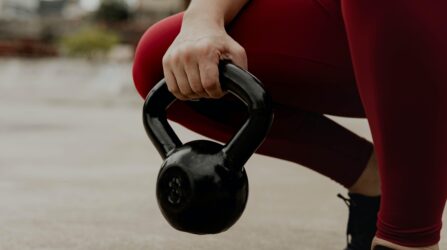-
Written by Jenny Donath

Cramps, fatigue, mood swings, cravings — the list goes on and on. Are you also dealing with PMS? Then you are not alone; three in four menstruating people experience at least one symptom, thanks to their ever-changing hormone levels. It doesn’t mean it’s fun though, right? There is help, though, gang. These supplements might be the very thing to help your PMS symptoms naturally.
Supplements that help your PMS symptoms
Gang, there are a ton of supplements that can help with your symptoms. From mood swings to cramps and everything in between, balancing your individual nutrition could save you days of feeling like crap. So, let’s get straight to it, shall we?
Calcium
Calcium is essential for the regulation of muscle contractions and is your go-to mineral for muscle irritability. And that includes cramps.
Upping your intake could also help with other PMS symptoms. The right amount of Calcium can alleviate mood swings, sadness, anxiety, irritability, fatigue, water retention, and bloating. It’s fab stuff.
Beware though, because there is a catch. For optimum uptake, Calcium works best in partnership with the right amount of Vitamin D. Speaking of…
Vitamin D
Vitamin D has great anti-inflammatory properties which can help with heavy bleeding and cramps. A high dose can even decrease the production of Prostaglandins —the reason we experience muscle contractions in the first place! But it gets better: Vitamin D could even lower your tendency to cry at Amazon commercials, thanks to its positive effect on mental well-being.
Magnesium
Magnesium naturally drops during your Luteal phase, making room for mood swings. If you’re a regular on the emotional rollercoaster, adding some Magnesium to your diet might be a good idea. Not only can it stabilize mood, thanks to its influence on Serotonin levels, but it can also help relax your muscles. Other positive effects are a decrease in bloating, headaches, breast discomfort, water retention, and stress. Yes, it’s amazing stuff.
But, there’s a catch with this one as well. This time, you need some Vitamin B6 for optimum Magnesium uptake. Which is handy…
Vitamin B6
Vitamin B6 is another beloved friend of your neurotransmitters, including Serotonin and Dopamine. Increase your intake to stabilize your mood and reduce fatigue and irritability.
Adding B6 to your diet can also work wonders as an energy booster, as it helps your body store protein and carbohydrates.
Vitamin E
Vitamin E is well-known for its antioxidant effects and its strengthening of the immune system. But did you know there’s evidence that it can help with PMS symptoms? Several studies have shown a reduction in cravings, mood swings, and breast tenderness after participants added a Vitamin E supplement to their diet.
Omega-3 Fatty Acids
There are three different types of omega-3: ALA, EPA, and DHA. Studies have found that EPA can be a valuable tool for those living with mood disorders. But it can also have a positive impact on physical PMS symptoms, including headaches, breast tenderness, and bloating.
Supplements that help with PMS: Herbals
It’s not just dietary supplements that can ease PMS symptoms. Lots of natural supplements claim to be beneficial, and they can be. But, they aren’t regulated in the same way, which means dose and purity can vary immensely. Use with care and the advice of a healthcare type.
Chasteberry
Chasteberry is believed to support the production of Progesterone, a crucial reproductive hormone. That in turn can help alleviate physical PMS symptoms, including breast discomfort, bloating, and headaches.
Evening Primrose Oil
You’ve probably heard your mum or nan talk about the PMS relieving properties of this herbal remedy. And they were right, up to a point. Rich in GLA, an omega-6 fatty acid, it can help alleviate cramps, mood swings, and the like. But as with all things hormone-related, the effects are highly individual.
Starflower Oil
Think of this one as Evening Primrose Oil, but better. And that’s because this extract from the Borage plant contains twice as much GLA. And as such, could help with breast tenderness and joint discomfort.
Supplements help PMS symptoms: What now?
Whatever PMS symptoms you’re experiencing, these supplements might just be your secret weapon, helping you safely journey through the last part of your Luteal phase. Which is never a bad thing.
But always remember, gang, we’re all different. Finding what works best for your individual symptoms might involve a little mixing and matching. But all of it will improve your health, and that’s always worth celebrating.
You’ve got this!
Disclaimer: This website does not provide medical advice. The information, including but not limited to, text, graphics, images and other material contained on this website are for informational purposes only. No material on this site is intended to be a substitute for professional medical advice, diagnosis, or treatment. Always seek the advice of your physician or other qualified healthcare provider with any questions you may have regarding a medical condition or treatment or before undertaking a new healthcare regimen, and never disregard professional medical advice or delay in seeking it because of something you have read on this website.

-


Dr Singh is the Medical Director of the Indiana Sleep Center. His research and clinical practice focuses on the myriad of sleep.




